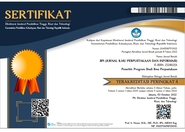EXPLORING EDUCATIONAL VALUES OF MARYAM BINTI IMRAN THROUGH ISLAMIC INFORMATION LITERACY
Abstract
Keywords
Full Text:
PDFReferences
Al-Attas, S. M. N. (1991). The Concept of Education in Islam: A Framework for an Islamic Philosophy of Education. ISTAC.
Az-Zuhaili, Wahbah. (2013). Tafsir Al-Munir: Akidah, Syari’ah, dan Manhaj, Jilid 2. Jakarta: Gema Insani.
Arikunto, S. (2018). Prosedur Penelitian Suatu Pendekatan Praktis. Jakarta: Rineke Cipta.
Dalimunthe, M. A., Syam, A. M., Suhendar, A., & Al-Mujtahid, N. M. (2024). Deconstructing Islamic cyberculture: Mitigating inferiority and cancel culture in virtual space. OPINI: Journal of Communication and Social Science, 1(2), 12–26.
Dalimunthe, M. A., Syam, A. M., Suhendar, A., & Ritonga, A. R. (2024). Optimizing local regulations in creating a balance of human health and environmental preservation. KOLABORASI: Journal of Multidisciplinary, 1(1), 1–12.
Fadhilah, U. (2020). Literasi Informasi dalam Perspektif Islam: Upaya Menumbuhkan Etika Bermedia Sosial. Jurnal Al-Bayan: Media Kajian dan Pengembangan Ilmu Dakwah dan Komunikasi, 26(1), 65–78. https://doi.org/10.22373/albayan.v26i1.7142
Fauzan, I., Arifin, A., Dalimunthe, M. A., & Rahmadani, S. (2023). The configuration of ethnic and religious relations towards the 2024 general election: A case study in Medan, Indonesia. Multidisciplinary Science Journal, 6(2), 2024006. https://doi.org/10.31893/multiscience.2024006
Hidayat, A. (2020). Literasi Informasi Islam: Pendekatan Teologis dan Edukatif. Jurnal Studi Islam dan Pendidikan, 5(2), 112–123.
Humaizi, Hasan, N. N. N., Dalimunthe, M. A., & Ramadhani, E. (2024). Harmony in virtual space: Forum Kerukunan Umat Beragama (FKUB) development communication in creating digital literacy based on religious moderation. Journal of Infrastructure, Policy and Development, 8(7), 4299. https://doi.org/10.24294/jipd.v8i7.4299
Indainanto, Y. I., Dalimunthe, M. A., Sazali, H., Rubino, & Kholil, S. (2023). Islamic communication in voicing religious moderation as an effort to prevent conflicts of differences in beliefs. Pharos Journal of Theology, 104(4). https://doi.org/10.46222/pharosjot.104.415
Kholil, S., Ismail, I., Dalimunthe, M. A., Suhendar, A., & Rambe, R. F. A. K. (2024). Strengthening religious moderation through PTKIN and SIT collaboration to build social harmony. JIPI (Jurnal Ilmu Perpustakaan dan Informasi), 9(2), 228–236.
Nasution, H. (2018). Islam Rasional: Gagasan dan Pemikiran Harun Nasution. Mizan.
Rambe, R. F. A. K., Ritonga, A. R., & Dalimunthe, M. A. (2023). Komunikasi publik pemerintah Kota Medan dalam pengalihan kewenangan kebijakan terkait UU No. 23 tahun 2014. KomunikA, 19(01), 39–44. https://doi.org/10.32734/komunika.v19i01.11411
Sikumbang, A. T., Dalimunthe, M. A., Kholil, S., & Nasution, N. F. (2024). Digital da'wah Indonesia ulema in the discourse of theology. Pharos Journal of Theology, 105(1), 1–14. https://doi.org/10.46222/pharosjot.1051
Suryana, D. (2022). Spiritualitas sebagai Mekanisme Koping: Telaah Konseptual dalam Perspektif Islam. Jurnal Psikologi Islam dan Budaya, 3(2), 103–116.
Syam, A. M., Dalimunthe, M. A., Suhendar, A., & Rambe, R. F. A. K. (2024). Islamic philosophy: A comparative perspective between Ibnu Khaldun and Karl Marx. SYAHADAT: Journal of Islamic Studies, 1(2), 55–72.
Yusanto, M., & Irfan, A. (2020). Pendidikan Karakter dalam Perspektif Islam. Gema Insani.
DOI: http://dx.doi.org/10.30829/jipi.v10i1.24165
Refbacks
- There are currently no refbacks.
Copyright (c) 2025 Rita Septiani, Junaidi Arsyad, Budiman Budiman

This work is licensed under a Creative Commons Attribution-ShareAlike 4.0 International License.










_1.png)
.png)
_.png)

